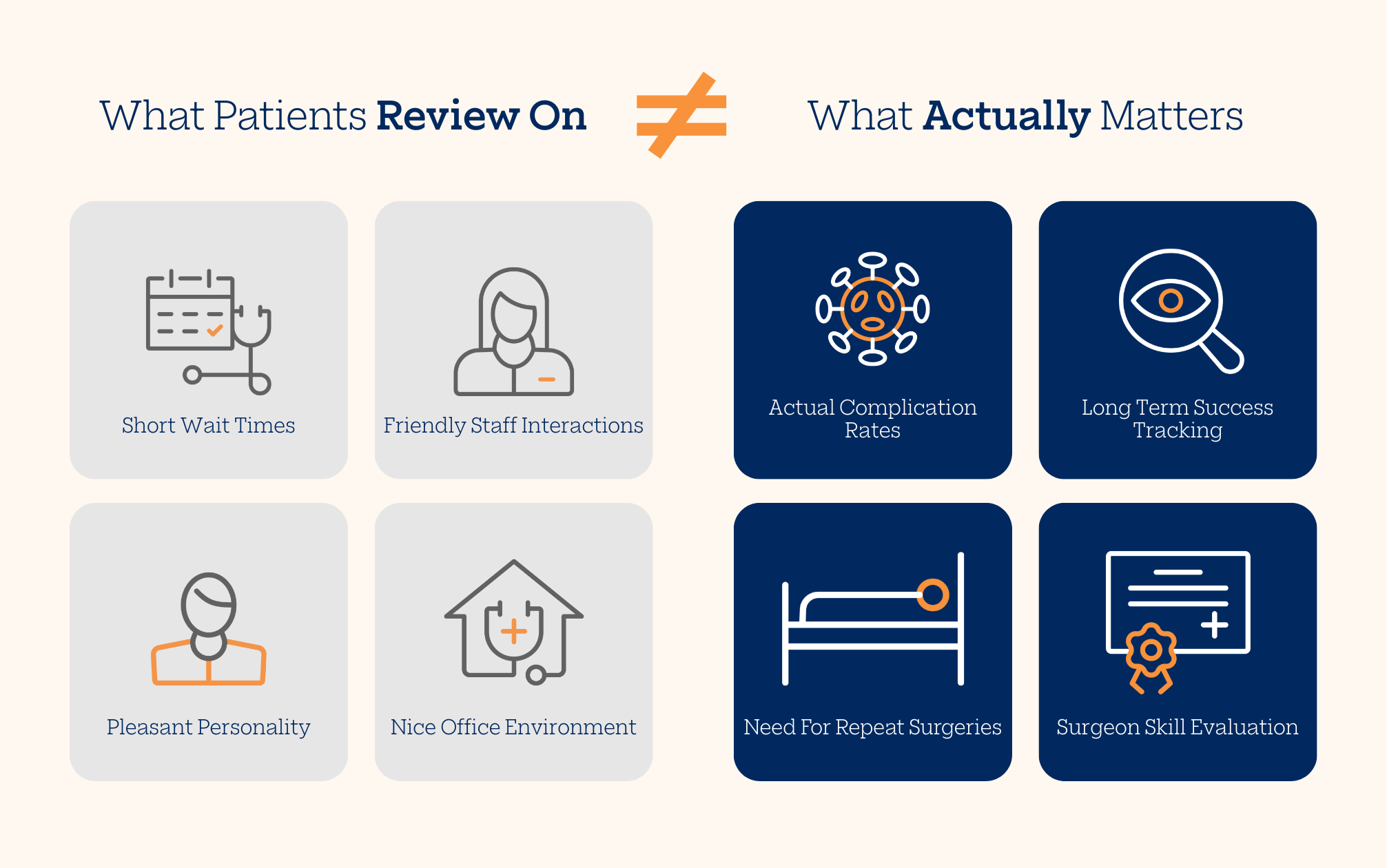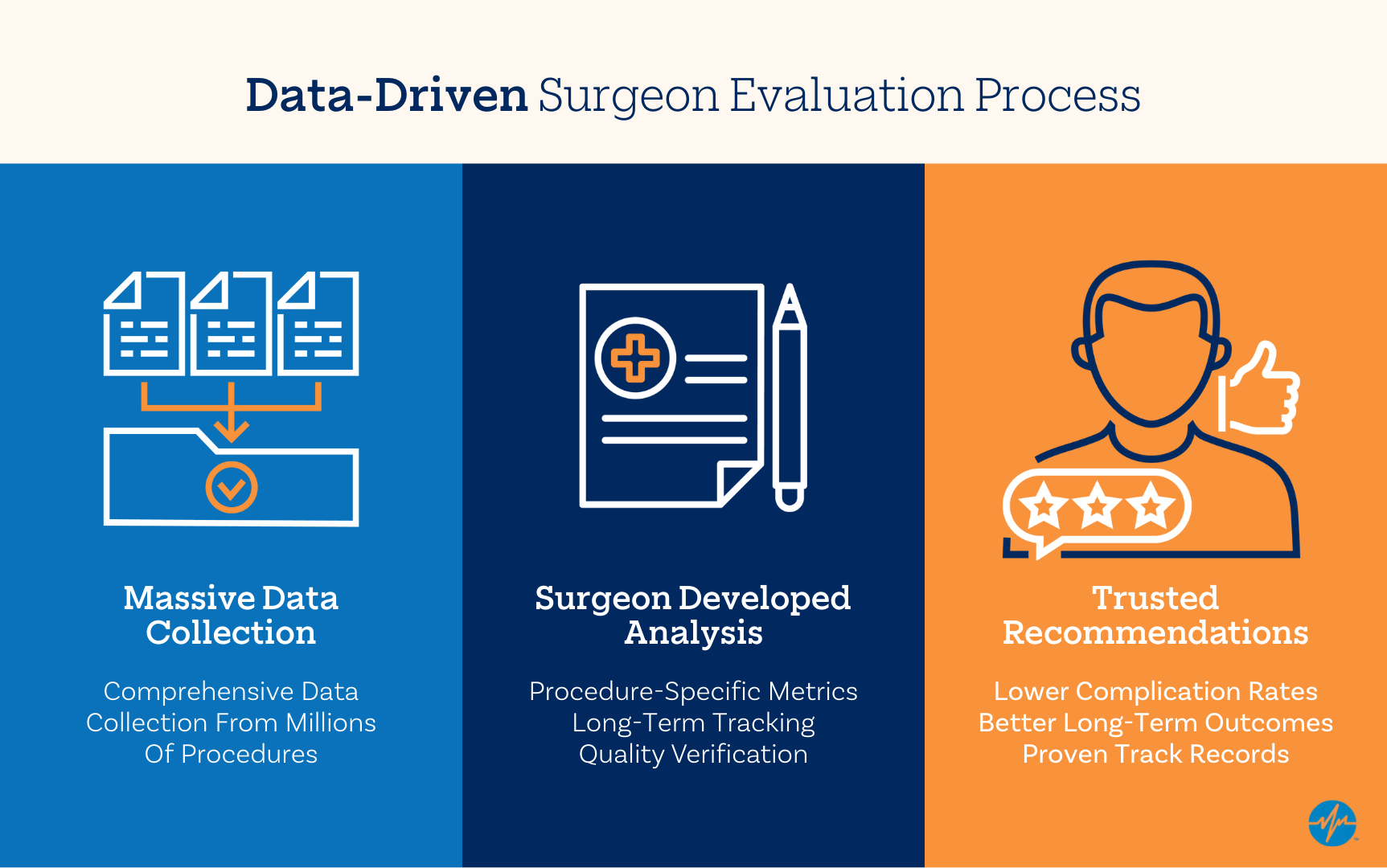When facing surgery, you want to make the best possible choice for your health and recovery. It’s natural to turn to the same resources you’d use for choosing a restaurant or hotel—online reviews, recommendations from friends, or your doctor’s suggestion.
But here’s what most patients don’t realize: star ratings and reviews tell you about bedside manner, not surgical outcomes.
The stakes couldn’t be higher. While a disappointing restaurant meal ruins your evening, choosing the wrong surgeon can impact the rest of your life. Yet the information most patients rely on has little connection to what actually determines surgical success.
Mary, a 70-year-old facing knee replacement surgery, experienced this challenge firsthand.
She received conflicting recommendations from friends about which surgeon was “the best.” The confusion left her anxious about making such an important decision. “I needed to trust that the surgeon I chose was totally vetted and had excellent outcomes,” she says. Mary’s experience shows why so many patients feel overwhelmed when trying to choose a surgeon.
Search for top-performing surgeons in your area →
The Growing Reliance on Flawed Information
The numbers tell a concerning story about how patients currently choose surgeons:
- Nearly 75% of patients turn to online reviews as their first step when searching for a new physician¹
- 73% of patients consider online reviews when selecting a physician²
- 60% of patients rely on referrals from family and friends²
- 58% of patients consider referrals from medical professionals²
This widespread reliance on traditional selection methods would be reassuring—if these sources actually predicted surgical quality. Unfortunately, research reveals significant problems with each approach.
The Problem with Online Reviews
Physician rating websites have become incredibly popular, but they’re fundamentally flawed as tools for evaluating surgical skill. Recent studies have uncovered serious data quality issues:
Most Review Sites Have Serious Problems
Researchers studied 49 doctor rating websites. They found major issues with over half of them³. The sites had wrong information and missing details that patients need to make good decisions. The biggest problem? Most negative reviews are missing, which makes all surgeons look better than they really are³.
Reviews Measure the Wrong Things

When researchers looked at what patients actually write about, they found reviews focus on how friendly the surgeon seemed, not their actual results⁴.
What gets high ratings?
Short wait times, nice bedside manner, and helpful staff⁵—not low complication rates or successful surgeries.
Different Sites Give Different Ratings
Here’s the most telling problem: when researchers compared the same surgeons across different review websites, they found very different ratings⁶. If these sites really measured surgical skill, you’d expect the ratings to match. They don’t.
Search for top-performing surgeons in your area →
What Reviews Miss: The Outcome Data That Actually Matters
While patients rate surgeons based on office experiences, the variation in actual surgical performance is staggering:
Huge Differences in Complication Rates
Studies show dramatic differences between surgeons doing identical procedures. Research on bariatric surgery found that patients treated by low-skill surgeons were at least twice as likely to die, have complications, need another surgery, or return to the hospital⁷.
Studies of spine surgery show this pattern across procedures. Even when comparing similar patients, some surgeons had complication rates of 2.5% while others had rates of 11.7%⁸—nearly a five-fold difference for the same surgery.
Some Surgeons Have Perfect Records
Analysis of Medicare data found almost 800 surgeons who performed at least 50 procedures with zero complications⁹. Meanwhile, their colleagues had much higher complication rates. This proves that excellent surgical outcomes are possible—if you know how to find these top-performing surgeons.
The Referral Problem: When Doctors Don’t Have the Data Either
Many patients assume their primary care doctor will recommend the best surgeon, but research reveals concerning limitations in referral patterns:
Most Patients Rely on Their Doctor’s Recommendation
When choosing a surgeon for major surgery, 31% of patients depend only on their primary doctor’s suggestion. Another 42% make their doctor an equal partner in the decision¹⁰. That means nearly three-quarters of patients base this critical choice mainly on their doctor’s recommendation.
Doctors Often Lack Quality Data Too
The problem? Most doctors don’t have access to reliable data about surgeon quality. Without objective information, they rely on reputation and personal relationships¹⁰. While primary care doctors have the best intentions, they don’t have access to reliable data about surgeon quality.
Insurance and Hospital Politics Affect Referrals
Research shows that referral patterns can be influenced by factors that have nothing to do with surgical quality. These include insurance network requirements, hospital system relationships, and cost considerations—none of which predict better outcomes for you.
A Better Way Forward
The good news? This information gap doesn’t have to exist.

At SurgeonCheck, we’re analyzing massive datasets to identify surgeons with consistently superior outcomes. Unlike traditional review sites or referral systems, we look beyond the typical 30-90 day tracking period that most systems use, following patients for years to capture complications that might emerge later.
Our data-driven approach includes:
- Analysis of surgical outcomes across millions of procedures
- Complication rates tracked from elective procedures (comparing apples to apples)
- Long-term tracking that extends far beyond the standard 30-90 day window
- Procedure-specific metrics developed by surgeons who understand what really matters
- Complete independence from financial relationships—we never accept payment from surgeons to be recommended
Making the Right Choice for Your Health
You wouldn’t choose a surgeon based on their office décor or how quickly they return phone calls. The consequences are too important. While traditional review sites and referrals provide some value for understanding the patient experience, they simply can’t tell you what you need to know about surgical skill and outcomes.
When facing surgery, you deserve access to the same kind of objective, data-driven analysis that you’d expect when making any other major decision. Your surgical outcome depends far more on your surgeon’s track record with your specific procedure than on how many stars they have online.
Just ask Mary, whose data-driven surgeon choice led to an excellent outcome.
“I feel like a twenty year old again!” she says at age 70. “I am grateful to SurgeonCheck as they were instrumental in helping me make one of the best decisions of my life.”
The surgeon you choose matters more than almost any other factor in determining your surgical outcome. Make sure you’re choosing based on what actually predicts success.
Ready to find a surgeon based on proven outcomes, not just online opinions?
References
- Healthgrades. “Online Reviews Impact How Patients Select Hospitals & Doctors.” June 2024. Available at: https://b2b.healthgrades.com/insights/blog/online-reviews-impact-how-patients-select-hospitals-doctors/
- RepuGen. “45 Statistics on Patient Reviews for Healthcare Professionals.” June 18, 2024. Available at: https://www.repugen.com/blog/statistics-on-patient-reviews-for-healthcare-professionals
- Mulgund P, Sharman R, Anand P, Shekhar S, Karadi P. “Data Quality Issues With Physician-Rating Websites: Systematic Review.” Journal of Medical Internet Research. 2020;22(9):e15916. Available at: https://www.jmir.org/2020/9/e15916/
- Applied Network Science. “Rating a Sports Medicine Surgeon’s ‘Quality’ in the Modern Era.” 2019. PMC. (URL pending verification)
- PMC. “Physician Rating Websites: an Analysis of Physician Evaluation and Physician Perception.” 2019. (URL pending verification)
- Hospital for Special Surgery. “Study Finds Little Consistency in Doctor Reviews on Three Physician Ratings Websites.” 2018. (URL pending verification)
- Birkmeyer JD, Finks JF, O’Reilly A, et al. “Surgical Skill and Complication Rates after Bariatric Surgery.” New England Journal of Medicine. 2013;369(15):1434-1442. Available at: https://www.nejm.org/doi/full/10.1056/NEJMsa1300625
- Martin BI, Mirza SK, Franklin GM, et al. “Hospital and Surgeon Variation in Complications and Repeat Surgery Following Incident Lumbar Fusion.” Health Services Research. 2013;48(1):1-25. Available at: https://www.ncbi.nlm.nih.gov/pmc/articles/PMC3465627/
- Medscape. “Online Scorecard Shows Surgeons’ Complication Rates.” 2019. (URL pending verification)
- Finn CB, Tong JK, Alexander HE, et al. “How Referring Providers Choose Specialists for Their Patients: a Systematic Review.” Journal of General Internal Medicine. 2022;37(13):3444-3452. Available at: https://pmc.ncbi.nlm.nih.gov/articles/PMC9550909/


